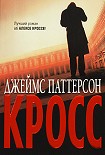
|
Кросс
ЧИТАТЬ
В ИЗБРАННОЕ Знаменитый детектив Алекс Кросс решил отойти от дел и вернуться к частной практике психотерапевта.
Но старый друг, детектив Сэмпсон, попросил его стать независимым консультантом по делу...
|